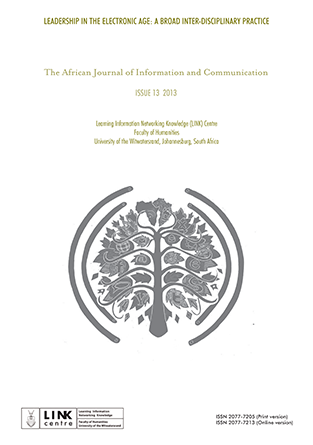The Effects on Policy of the Composition of the ICT Public Policy Network in Swaziland
Keywords:
policy networks, government, conformist actors, foreign intervention, ICT policy, SwazilandAbstract
The composition, relationships, alliances, power structures, norms and bureaucracies in policy networks affect not only the policymaking process but also the policies that result. This article reports on a study which analysed the dynamics of the ICT policymaking network in a developing country, Swaziland. The study uses a policy network analysis (PNA) approach to analyse the Swaziland national ICT policy network. The findings of the study show that government recruited mainly conformist actors into the policy network so as to meet set deadlines, and that policymaking was dominated by political agendas and strong foreign intervention, while side-lining key local policy actors.
References
Barnes, T. (2006). Nation-building without mortar? Public participation in higher education policy-making in South Africa. Perspectives in Education, 24(1), 1-14.
Blom-Hansen, J. (1999). Policy-making in central-local government relations: Balancing local autonomy, macroeconomic control, and sectoral policy goals. Journal of Public Policy, 19(3), 237-264. https://doi.org/10.1017/S0143814X99000251
Borzel, T. (1998). Organizing Babylon – on the different conceptions of policy networks. Public Administration, 76, 253-273. https://doi.org/10.1111/1467-9299.00102
Chigona, W., Vergeer, J. & Metfula, A. (2012). The South African broadband policy: In the eyes of the media, Info, Vol 14(4). https://doi.org/10.1108/14636691211240870
Cloete, F., Wissink, H., & De Coning, C. (eds). (2006). Improving public policy: From theory to practice (2nd ed.). Van Schaik Publishers.
Daugbjerg, C. & Pedersen, A. (2004). New policy ideas and old policy networks: Implementing green taxation in Scandinavia. Journal of Public Policy, 24(2), 219-249. https://doi.org/10.1017/S0143814X04000050
Delano, R. (2009). The globalisation of ICT. Black Business Quarterly, 30(7), 40-41.
Dye, T. (1978). Understanding public policy (3rd ed). Eagle Wood Cliffs, New Jersey: Prentice-Hall, Inc.
Erridge, A. & Greer, J. (2000). Policy network analysis of UK central government civil procurement. Public Policy and Administration, 15(4), 25. https://doi.org/10.1177/095207670001500403
Gillwald, A. (2010). The poverty of ICT policy, research and practice in Africa. Information Technologies & International Development, 6, 79-88.
GoSa (2005). The Constitution of the Kingdom of Swaziland. Government of Swaziland (GoS), Mbabane, Swaziland.
GoSb (2005). National information and communication infrastructure (NICI) policy and plans. Government of Swaziland (GoS), Mbabane, Swaziland.
Heeks, R. (1999). Information and communication technology, poverty and development. Institute for Development Policy and Management, University of Manchester, UK.
Hosman, L. (2010). Policies, partnerships, and pragmatism: Lessons from an ICT-in-education project in rural Uganda. Information Technologies & International Development, 6(1), 48-64.
Howlett, M., Ramesh, M. & Perl, A. (2009). Studying public policy: Policy cycles and policy subsystems (3rd ed). Oxford University Press.
James, T. & Jorgensen, P. (2009). Policy knowledge, policy formulation, and change: Revisiting a foundational question. Policy Studies Journal, 37(1), 141-162. https://doi.org/10.1111/j.1541-0072.2008.00295.x
Kendall, K., Kendall, J. & Kah, M. (2006). Formulating information and communication policy through discourse: How Internet discussions shape policies on ICTs for developing countries. Information Technology for Development, 12(1), 25-43. https://doi.org/10.1002/itdj.20004
Liu, X., Lindquist, E., Vedlitz, A. & Vincent, K. (2010). Understanding local policymaking: Policy elites’ perceptions of local agenda setting and alternative policy selection. Policy Studies Journal, 38(1), 69-91. https://doi.org/10.1111/j.1541-0072.2009.00347.x
Marsh, D. & Rhodes, R. (eds). (1992). Implementing Thatcherite policies: Audit of an era. Open University Press.
Metfula, A. (2013). The interplay between policy network actors and the information and communication technology in a developing country context, PhD thesis, University of Cape Town, Cape Town.
Mohamed, S. (2006). From ideas to practice: The involvement of informal settlement communities in policy-making at city level in South Africa. South African Review of Sociology, 37(1), 35-47. https://doi.org/10.1080/21528586.2006.10419159
Moran, M., Rein, M. & Goodin, R. (eds). (2006). The Oxford handbook of public policy. Oxford University Press.
Norton-Griffiths, M. (2010). The growing involvement of foreign NGOs in setting policy agendas and political decision-making in Africa. Economic Affairs, 30(3), 29-34. https://doi.org/10.1111/j.1468-0270.2010.02009.x
Osman, A. (2008). Democracy and governance in Africa: Complimentary or controversial? In Moshi, L. & Osman, A. (eds.), Democracy and culture: An African perspective (p. 127-143). Adonis & Abbey Publishers Ltd, London.
Rhodes, R. (1988). Beyond Westminster and Whitehall: The sub-central governments of Britain. Unwin Hyman.
Rhodes, R. (1997). Understanding governance: Policy networks, governance, reflexivity and accountability. Open University Press.
Stanforth, C. (2006). Using actor network theory to analyse e-government implementation in developing countries. Journal of Information Technologies and International Development, 3(3), 35-60. https://doi.org/10.1162/itid.2007.3.3.35
Downloads
Published
Issue
Section
License
Copyright (c) 2013 https://creativecommons.org/licenses/by/4.0

This work is licensed under a Creative Commons Attribution 4.0 International License.
How to Cite
- Abstract 290
- pdf 123


.png)